Coating the World with Kindness
Dreamers and Doers Series
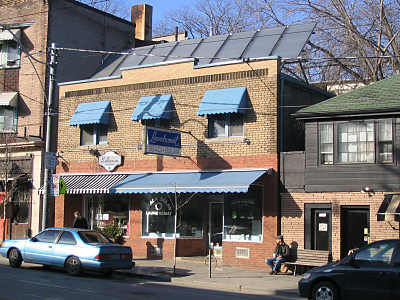
Most people equate dreaming and doing with financial success. Alex Winch of Beach Solar Laundromat/Monk’s Fine Fabric Care of Toronto pictures real success as making a positive difference in people’s daily lives. And he doesn’t mean just being open convenient hours, either.
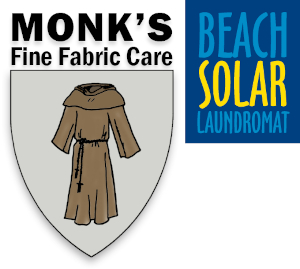
The Beach Laundromat began operation in 1964, and is the longest serving laundromat in the Beach. Winch bought the Beach Laundromat in September 2002, and commenced a complete mechanical systems retrofit, dramatically improving the efficiency of the water heating, lighting and space heating systems. He re-branded the business as The Beach Solar Laundromat.
The “Solar” part of the name comes because the laundromat uses eight solar thermal panels to heat water for the laundromat, potable water for the second floor apartment and for space heating in radiators. It was an old building, put up in 1939, and the mechanical retrofit took place in 2002 and 2003.

Side benefits in the retrofit include:
- Natural gas consumption has been reduced by approximately 30% as a result of the energy initiatives undertaken.
- Revenues grew 160% over eighteen months as customers actively choose the Beach Solar Laundromat because of its environmentally friendly energy initiatives.
The environmental efforts of Beach Solar Laundromat have garnered both national and international recognition.
But that’s not what this story is about.
Stolen sweaters
It all started in November, 2023 when a customer of Beach Solar Laundromat told Alex that she’d seen a woman stealing sweaters from her dryer load. Alex reviewed the video footage and confirmed what had happened. He later saw the woman who took the sweaters walking past the laundromat, and decided to dig further.
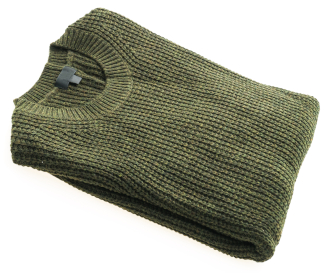
“I talked to her and was able to hear her world through her experience,” he said. “She was cold and homeless. In her mind, she was justified in the conscious decision to take sweaters from a dryer. She was clear and resolute. In thinking about what she said afterwards, I thought of possible paths forward that would have changed the outcome.”
For instance, if he’d been there when the incident happened and he had a coat, Alex would have given it to her and tried to get the sweaters back. But he couldn’t be on-the-spot all the time. To protect his customers and serve the people of the community, he had to think creatively.
That’s when Alex put up a coat rack outside the store. He called it Monk’s Coat Rack, after the dry cleaning side of the business, and hung some coats on it. The signage says it all.
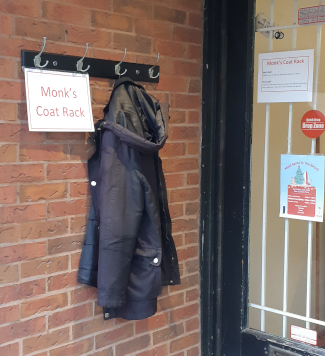
Do you need a coat?
If there’s one on the rack, please feel welcome to take it.
Have a coat?
If there’s a free hook on the rack, feel welcome to donate a clean, warm coat. Please don’t leave coats on the ground.
“There is no paperwork, no locks on the coats, no judgment of what constitutes ‘real need’,” he said. The area is well lit and feels safe for people who want to take a coat.
A movement is born?
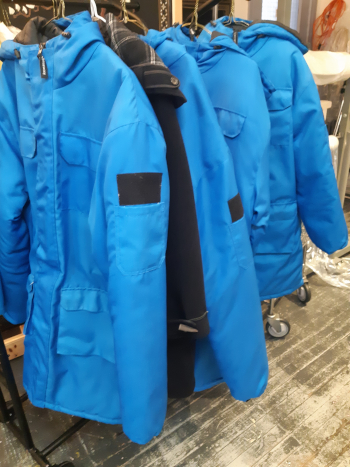
People are grateful for the coats, as evidenced by the steady turnover on the rack. Someone suggested that hats and gloves would be a good addition, and Alex added some clips to organize hats, mittens and socks.
“I think we’ve seen more than a hundred coats find new owners since November,” Alex said. “So far, we’ve had wonderful support from our neighborhood, with many coats donated — enough that I have been able to share a few coats with a refugee shelter in North Toronto (including four matching City of Toronto maintenance worker winter coats that were never picked up by the City at a dry cleaner) and have given a few bags of clothes to the Out of the Cold Friday night program at Eastminister United on the Danforth,” he said.
It’s just a little rack, and can only sustain so many people. But Alex thinks there’s a real need for the service.
“I’m just a little guy. It would be great if little coat racks could be set up in neighborhoods across Canada. A big corporation is welcome to brand it. I can imagine the ‘Tim Horton’s Community Coat Rack’ or 7-11. Or Esso.”
“We all experience winter. Those with coats and homes can embrace the season with skates, skis and toboggans, warmth, laughter and happiness. For a homeless person without a coat, winter is far harder to embrace.”
It’s not a one-off
Alex doesn’t content himself with giving out a few coats to chilly folks. He’s made it part of the heartbeat of his company to help people in need.

“We have a pay-it-forward program, enabling customers in self-declared need to do their laundry for free, and those who want to help to leave a donation to fund that for someone. It started in 2015, and we now give away about $200 a month in laundry service. We also use the tokens from another laundromat that started showing up in my machines mixed in with the regular coins, and we set the tokens aside in a jar. When a customer asks, we can use the tokens to start the machine. When I do the coin count, I just separate out the tokens, and they go back in the jar.”
You can see videos of people hanging up coats for others, or how the pay-it-forward program works on Alex’s website. He’s very open about what he’s doing, and obviously is not worried about being taken advantage of.
What about the thief … and the victim?
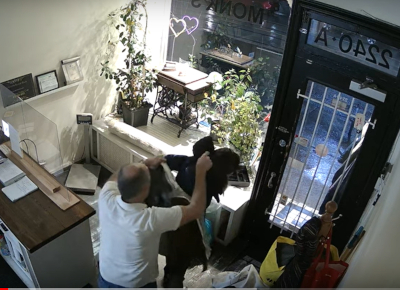
Those sweaters are still “missing.” But Alex isn’t worried about it.
“I haven’t spoken to the woman who took the sweaters since that night in November. The woman whose sweaters were stolen was and remains a regular customer, though. She has seen the security camera footage of what happened that night, is understanding of the need and of the moral dilemma in choosing not to call police to attempt enforcement, and is supportive of the coat rack,” he said.
Plenty of media attention has come to Monk’s Coat Rack—television, newspaper articles, radio stories. Word has spread of what is being done, and people like to contribute coats and hats to the rack, or free laundromat service to those in need, as a result. But the attention isn’t why the company does it.
Alex is a rare individual who saw a problem and thought of a non-traditional way to solve it. In the process — though acknowledging he can’t fix the whole world — he is doing what he can to fix his corner of it. He’s a dreamer and a doer worth emulating.






